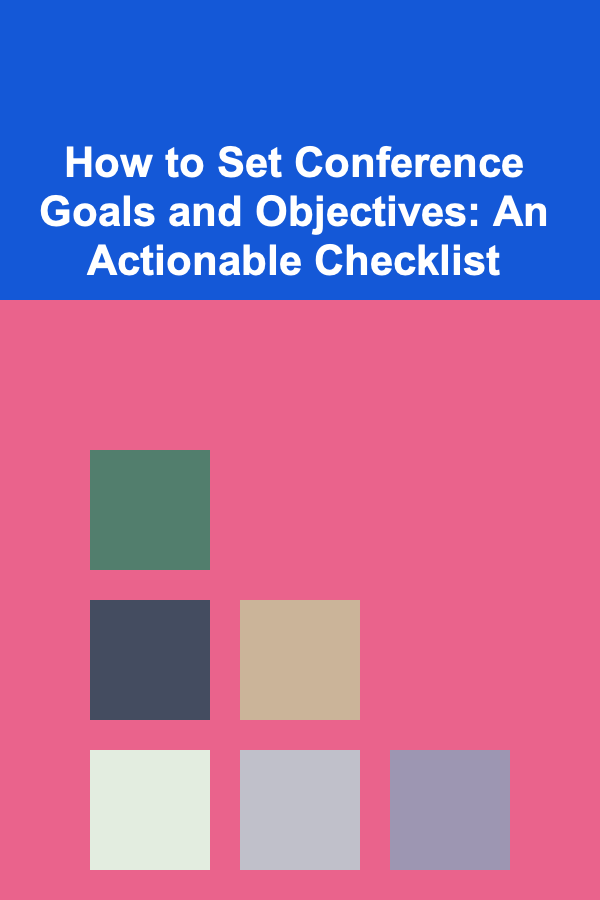
How to Set Conference Goals and Objectives: An Actionable Checklist
ebook include PDF & Audio bundle (Micro Guide)
$12.99$9.99
Limited Time Offer! Order within the next:

Conferences, whether in-person or virtual, offer significant opportunities for learning, networking, and advancing your professional career. However, to truly benefit from a conference, it's essential to approach it with clear goals and objectives. Setting these from the outset ensures that you focus your efforts, make the most of your time, and achieve tangible outcomes.
This actionable guide provides a detailed checklist for setting conference goals and objectives, ensuring that you maximize the value of your participation.
Define Your Primary Purpose for Attending
The first step in setting conference goals is to clarify your primary purpose for attending. Why are you participating in this event? Your reason will guide all other goals and decisions related to the conference.
Key Questions to Ask Yourself:
- What knowledge or skills do I want to gain? Are you attending to learn about specific industry trends, acquire technical skills, or explore new tools?
- Is networking a priority? Do you want to meet potential business partners, collaborators, or industry peers?
- Are you aiming for business development or sales opportunities? Are you there to generate leads, pitch a product, or close deals?
- Is there a career advancement angle? Are you hoping to gain visibility, explore new career opportunities, or meet influencers in your field?
Answering these questions will help you create a foundational goal and give purpose to every activity and decision during the event.
Set Specific, Measurable Goals
Once you have identified your primary purpose for attending the conference, it's time to set specific, measurable goals that will help you track progress. These goals should be concrete and aligned with the overall purpose you defined.
Examples of Specific, Measurable Goals:
- Attend at least five keynote sessions or workshops to acquire knowledge about cutting-edge industry trends.
- Connect with 20 potential leads or contacts during networking events or sessions.
- Schedule three follow-up meetings with people you meet at the conference to discuss partnership opportunities.
- Acquire two or more actionable takeaways from each session you attend.
When setting measurable goals, be sure to also establish a timeframe for achievement---whether it's a specific session time, a networking event, or an action you plan to take immediately following the conference.
Align Goals with Your Personal or Business Strategy
Every conference presents an opportunity to push forward your personal or business objectives. Whether you are attending as an individual or as part of a team, ensure your conference goals support long-term ambitions.
Action Steps:
- Review your personal or business strategy before the conference to identify areas that need improvement or attention. For example, if you're looking to expand into new markets, attending workshops or sessions focused on international business development could be useful.
- Identify areas of professional development that align with your career goals. This may include honing specific skills or gaining insights into future industry challenges.
- Tailor your networking and engagement to align with key strategic goals. If your business is focusing on innovation, aim to connect with thought leaders and early adopters in your industry.
Ensuring that your conference objectives align with these larger strategies will make the event more valuable in terms of both immediate takeaways and long-term impact.
Prioritize Key Sessions and Networking Opportunities
One of the challenges at conferences is the overwhelming number of sessions, workshops, and networking events available. To avoid feeling lost or overwhelmed, prioritize the most critical opportunities that align with your goals.
Actionable Steps:
- Review the event schedule in advance and identify the sessions that are most relevant to your goals. Mark these as high-priority and commit to attending them.
- Set a networking strategy: Based on your goals, decide who you want to connect with. Research key speakers, panelists, and other attendees who align with your objectives and plan to engage with them.
- Allocate time for informal networking: Conferences often have meals, coffee breaks, or social events. Use these moments to casually network, but also make sure to be strategic in your conversations.
Effective prioritization will ensure that you don't waste time on less relevant activities and focus on opportunities that will move you closer to your conference goals.
Develop a System for Tracking Your Progress
While you're at the conference, you'll need a way to track progress toward your goals. Having a system in place will help you stay organized, evaluate your performance, and adjust course if needed.
Suggestions for Tracking:
- Create a goal tracking sheet: Whether digitally (using Google Sheets, Excel, or an app) or on paper, keep a simple log of your goals and actions. This sheet should include space to record key takeaways from sessions, new connections made, and action items for follow-up.
- Use a conference app or planner: Many conferences have official apps or digital planners that allow you to track sessions you've attended, schedule one-on-one meetings, and take notes during events. Take advantage of these tools for better organization.
- Evaluate after each day: At the end of each day, reflect on whether you've met your goals and make adjustments for the following day. Are you on track to attend the sessions that matter? Have you met your networking targets?
By tracking your progress, you can stay on top of your goals and avoid missing out on important opportunities.
Plan for Post-Conference Actions
Setting goals for the conference itself is only half the battle. After the event, it's important to follow up on connections, review what you learned, and take concrete actions that will help you integrate the experience into your ongoing work or business.
Post-Conference Steps:
- Follow up with contacts: Within 24-48 hours after the event, send a follow-up email or message to the people you met, referencing your conversation and outlining potential next steps. This shows initiative and strengthens the relationship.
- Review your notes and key takeaways: Go through the materials you gathered during the conference and identify which insights are most actionable. Set up a meeting with your team (if applicable) to share the knowledge gained.
- Integrate new ideas into your strategy: Whether it's adopting new tools, shifting your approach based on trends you learned about, or fostering new relationships, integrate the conference experience into your personal or business strategy.
- Measure your conference ROI: Reflect on whether the conference achieved your initial goals. Were the sessions relevant? Did you build valuable relationships? What can you do better next time?
This post-conference review ensures that your experience isn't just a one-time event but something that feeds into your broader professional development.
Adjust and Refine for Future Conferences
Finally, it's essential to learn from your conference experience to improve your goal-setting process for future events.
Action Steps:
- Assess the effectiveness of your goals: Were your goals realistic? Did they align well with the conference's offerings? Did you achieve them? This reflection will help you set more targeted and achievable goals next time.
- Refine your networking strategy: If certain approaches worked better than others, document them. For example, did face-to-face meetings lead to more meaningful connections than virtual ones?
- Evaluate your time management: Were you able to balance sessions, networking, and downtime effectively? For future conferences, consider ways to optimize your schedule even further.
By continuously refining your goal-setting and conference strategy, you ensure that each event becomes a stepping stone toward greater professional success.
Conclusion
Setting clear, actionable goals and objectives before attending a conference is the key to maximizing your experience. By defining your purpose, setting specific and measurable goals, aligning them with your personal or business strategy, and prioritizing key activities, you'll ensure that you make the most of your time and energy.
Remember that success isn't just about what happens during the event---it's also about how you follow up and integrate your experiences into your ongoing professional journey. By committing to a thorough and strategic approach, you can unlock the full potential of every conference you attend.

How To Improve Your Stage Presence as a Musician
Read More
How to Manage Property Inspections Without Annoying Your Tenants
Read More
How to Organize Holiday Decorations in Your Home Inventory
Read More
How To Plan a Solo Hiking Trip
Read More
How to Use Online Surveys to Make Money
Read More
How to Use Professional Photography to Make Money
Read MoreOther Products

How To Improve Your Stage Presence as a Musician
Read More
How to Manage Property Inspections Without Annoying Your Tenants
Read More
How to Organize Holiday Decorations in Your Home Inventory
Read More
How To Plan a Solo Hiking Trip
Read More
How to Use Online Surveys to Make Money
Read More